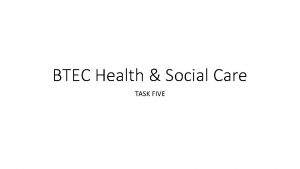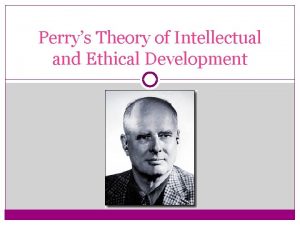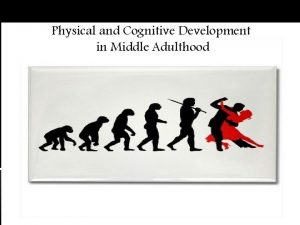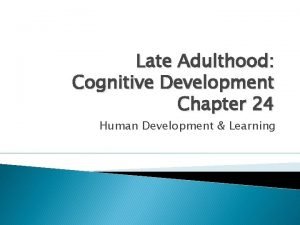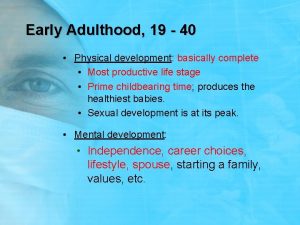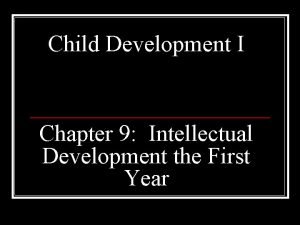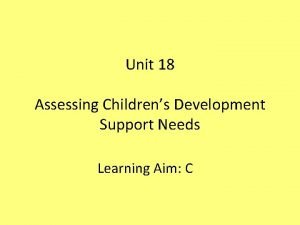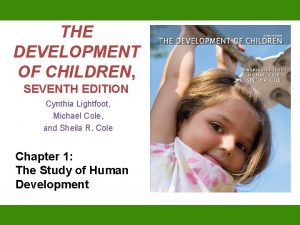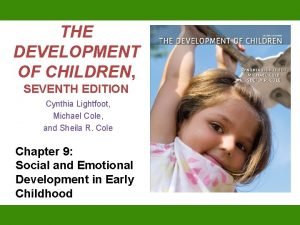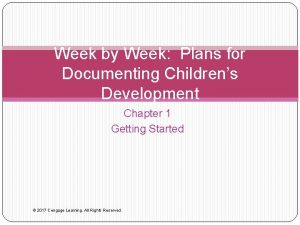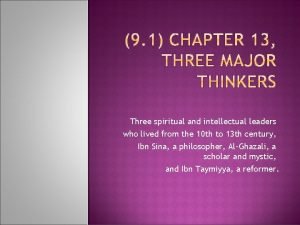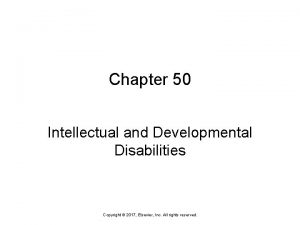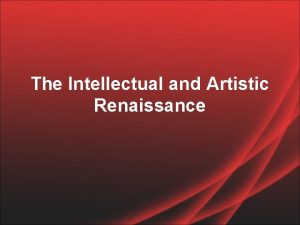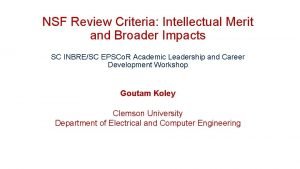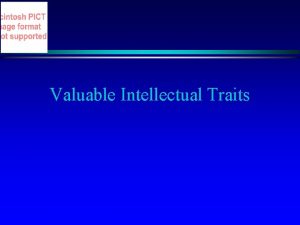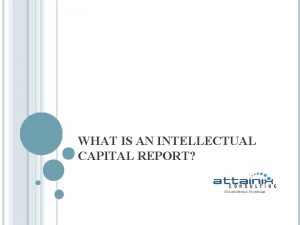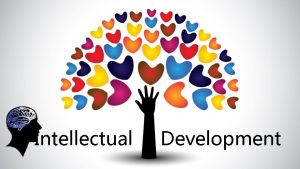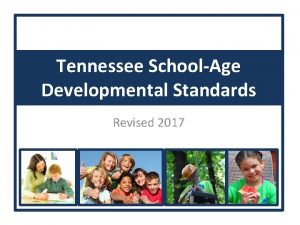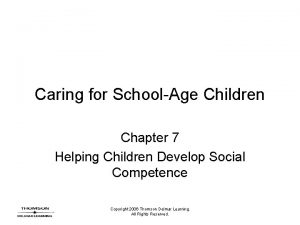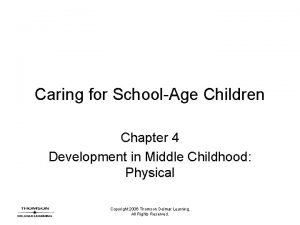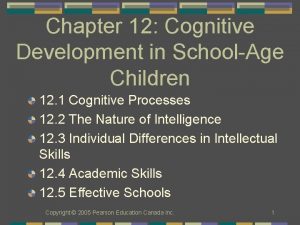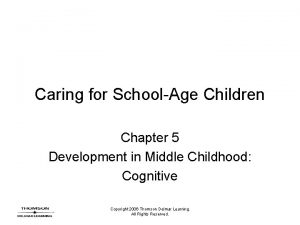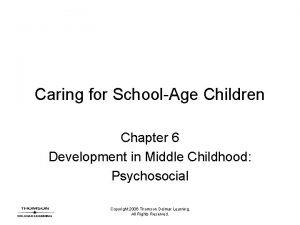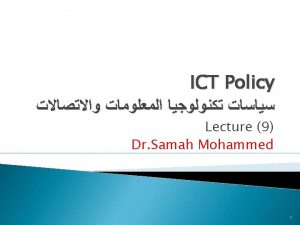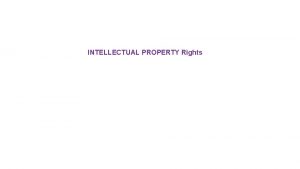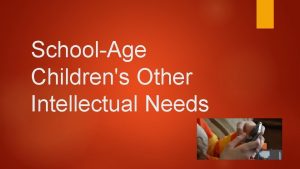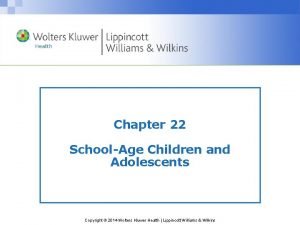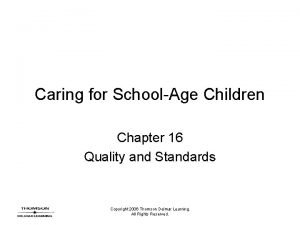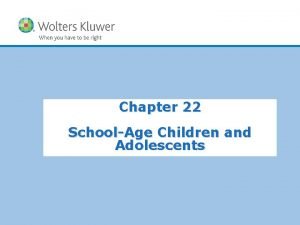INTELLECTUAL DEVELOPMENT OF SCHOOLAGE CHILDREN HOW AND WHAT

















- Slides: 17

INTELLECTUAL DEVELOPMENT OF SCHOOLAGE CHILDREN

HOW AND WHAT SCHOOL-AGE CHILDREN LEARN BRAIN DEVELOPMENT AND COGNITIVE CHANGES v From age 8 -11 two major changes occur in the brain, they are: 1) Wiring in the prefrontal cortex – the prefrontal cortex is responsible for logical thinking, forming judgments, memory, weighing consequences, decision making and controlling impulses and emotions. 2) Pruning – this makes for faster and more efficient thinking. v The nucleus accumbens is the pleasure and reward part of the brain and is overdeveloped during the school-age years. For this reason school-age children may make poor decisions in anticipation of a reward or pleasure.

COGNITIVE ADVANCES Logical thinking becomes more possible because of all the cognitive development in the brain during the school-age years. A child needs to be able to pull from their memories and retrieve relevant information. To do this children must depend on cognitive changes in attention and memory. q Attention – for children to be able to think logically and solve problems they have to be able to pay attention. Focusing is very important at this stage of development.

COGNITIVE ADVANCES q Memory – this is vital to logical thinking and problem solving. You have to be able to draw on information you have stored in order to be able to solve current problems. q Short-term memory does not increase much after early school-age but long term memory (implicit and explicit memories) grow significantly during this time. Children develop the following skills during this time: a) Rehearsing – this is where children learn how to repeat information until it is learned. b) Organizing information – children learn to organize information for long-term memory use, often by categorizing the information learned c) Using visual and verbal aids – children learn how to use visual aids, such as charts, graphs and outlines to help them recall information. q Besides being able to remember children will have a better understanding of things and how they work.

PIAGET’S STAGES OF INTELLECTUAL DEVELOPMENT THE CONCRETE OPERATIONAL STAGE v This stage is where children make decisions based on past experiences. With each year children apply more logic and less perception to their decisions. THE FORMAL OPERATIONAL STAGE v This is Piaget’s last stage of development and where children learn to reason more abstractly. Children are able to plan ahead and make strategies about their next move.

OBSTACLES TO LOGICAL THOUGHT Ø School age children start to become less egocentric and better able to see things from another’s point of view. Ø School-age children learn to focus on more than one part of an object or situation at a time. Children start using the aspect of conservation or the concept that changing an object’s shape, direction or position does not change or alter it’s quantity. Ø School-age children are able to better understand a sequence of changes or transformations. They can learn to see a series of events in order like the changing of ice to water. Ø School-age children are now better able to understand reversals. They can carry out a task in reverse order. Clay is a good example of this principle a ball of clay can be flattened but then made into a ball again.

OBSTACLES TO LOGICAL THOUGHT Ø School-age children are now capable of deductive reasoning which means they can reason from general to specific. Example being: all fish live in water and if a child is asked about a guppy and they know it is a fish then they can reason it must live in water. Ø Older school-age children learn inductive reasoning which is reasoning from specific facts to general. This is where a child have several ideas, test them and then draw their own conclusion.

VYGOTSKY’S AND GARDNER’S THEORIES q Vygotsky sees intellectual development as less dependent on the brain and more dependent on a child’s zone of proximal development (ZPD). Vygotsky believed that collaboration among peers, adults and children had a great impact of learning. q Gardner’s theory is based on believing in multiple intelligences or intellectual abilities that contribute to overall intelligence. Gardner proposed a multiple list of intelligences. School learning enforces some of the intelligences but he does not believe it gives them all the opportunities that they need for all intelligences.

CONCEPT LEARNING PHYSICAL KNOWLEDGE – this type of knowledge involves learning about attributes of objects and what happens when they are acted upon. Physical knowledge is any knowledge of the physical world that is gained through experimentation with objects. With improved memory children are able to pay attention to important attributes and recall the names of the attributes.

THE USE OF LOGICAL THINKING CONCEPTS • During the school-age years children start to grasp logical thinking concepts which are concepts that are not experienced through the senses but are understood intellectually. This concept is due to the development of the logical brain where classifying objects, ordering by attributes, understanding cause and effect, applying spatial concepts, using number concepts, and noting distance , time and speed are being becoming more clear. q Classifying objects – is part of the reasoning process and is the grouping of objects into a class and its complement. School-age children also learn new classification called hierarchical classification where classes are subdivided. q Ordering by attributes – children learn to arrange objects in order by the increasing or decreasing magnitude of one of the object’s attributes. (color, shape, size)

THE USE OF LOGICAL THINKING CONCEPTS q Understanding Cause and Effect – school-age children start to realize that not all things that happen are caused by humans. They also start to have more scientific beliefs and that inanimate objects are not living. q Applying spatial concepts – school-age children are able to grasp many of the spatial concepts. They understand near and far, open or closed, behind, or in front of, etc.

THE USE OF LOGICAL THINKING CONCEPTS q Using number concepts – school-age children are starting to comprehend number concepts such as greater than and less than and others. Children start to understand how to add and subtract by groups, understand measurements, decimals, percentages and fractions. q Noting Distance, time and speed – most school-age children do not learn calendar time well until around 10 -12 years of age. They are starting to get a better grasp on time and how far away things are distance wise.

CULTURE-SPECIFIC KNOWLEDGE • Culture specific knowledge is knowledge that is learned by being told or shown. This is social knowledge because you learn it by someone telling you how to do it or showing you what to do. Children learn about their culture in school and about other cultures as well.

COMMUNICATING v School-age children are learning that language is way of communicating and they are wanting to talk with friends and parents. School-age children are learning to read and associate letters with certain sounds. v Learning articulation – by the school-age years children have mastered articulation of most all sounds in their spoken language. If a child is experiencing difficulties in speech they may require speech therapy to help them master certain articulation skills. v Expanding vocabularies – school-age children continue to be able to expand their knowledge of vocabulary. They learn to have fun with language by creating raps, chants, rhymes and by telling jokes.

COMMUNICATING v Learning grammar – school-age children are refining their skills in grammar. They are learning how to read sentences that are full of explanatory information and understand what the sentence is saying. School-age children usually speak and write the grammar that they hear and can change if they are around someone that has different cultural aspects or different age aspects to their language. v Reading in the school-age years – reading can be difficult for young reader due to the letter-to-sound relationships that are not consistent. Ex: rain or rein During the school-age years children will start to become better able to read quickly and accurately and have a clearer grasp about letter-to sound relationships.

INTELLECTUAL MILESTONES 6 -7 YEAR OLDS Ø Can sit and pay attention for about 15 -20 minutes Ø Tells and retells a story in logical order Ø Is able to read and write and do some math Ø Uses descriptive language when talking 8 -9 YEAR OLDS Ø Can sit and pay attention for about 45 minutes Ø Remembers large amounts of information Ø Knows left from right Ø Writes legibly and organizes writing

INTELLECTUAL MILESTONES 10 -12 YEAR OLDS Ø Applies math and science concepts to daily activities Ø Expresses needs verbally and tries to justify needs Ø Writes notes and letters Ø Develops plans to meet goals Ø Edits writing for grammar, mechanics and spelling
 Intellectual health and social
Intellectual health and social Perry’s theory of intellectual and ethical development
Perry’s theory of intellectual and ethical development Cognitive development for middle adulthood
Cognitive development for middle adulthood Intellectual development in older adulthood
Intellectual development in older adulthood Early adulthood physical development
Early adulthood physical development Chapter 9 intellectual development in the first year
Chapter 9 intellectual development in the first year Characteristics of cognitive development
Characteristics of cognitive development Unit 18 assessing children's development support needs p1
Unit 18 assessing children's development support needs p1 The development of children 7th edition
The development of children 7th edition Gordon lightfoot ethnicity
Gordon lightfoot ethnicity Week by week plans for documenting children's development
Week by week plans for documenting children's development The intellectual and spiritual leaders.
The intellectual and spiritual leaders. Chapter 50 intellectual and developmental disabilities
Chapter 50 intellectual and developmental disabilities Key intellectual movement of the renaissance
Key intellectual movement of the renaissance Nsf broader impacts and intellectual merit
Nsf broader impacts and intellectual merit Intellectual traits
Intellectual traits Climax of huckleberry finn
Climax of huckleberry finn Intellectual capital examples
Intellectual capital examples
